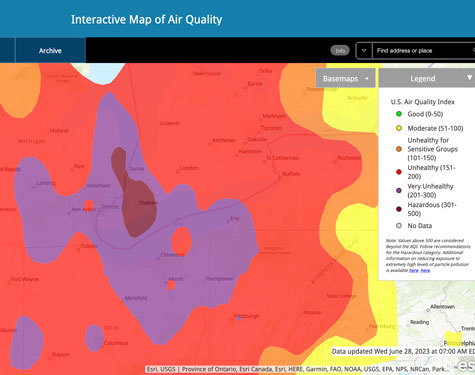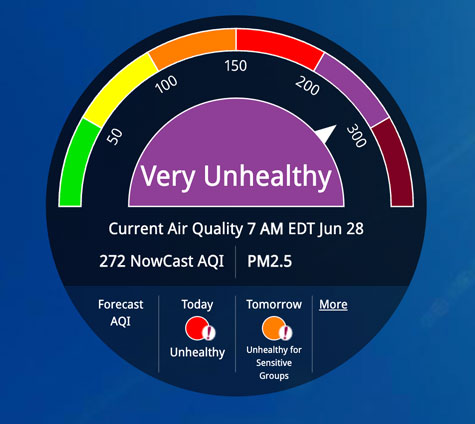Stay up to date on all things Northeast Ohio with our free weekly “In the CLE” newsletter. Arriving in your inbox every Wednesday, this weekend to-do list fills you in on everything from concerts to the latest news. Click here to subscribe.
Clevelanders Urged to Stay Indoors As Smoke from Canadian Wildfires Hits Cleveland
by Dillon Stewart | Jun. 28, 2023 | 12:00 PM

Dillon Stewart
Update 6/28, 3:05 p.m.
Downtown Cleveland Alliance has cancelled all events on June 28, including Warehouse Wednesday, Walnut Wednesday, Gigs on the Green, Take a Hike and Lakefront Leagues.
Blossom Music Center also issued the following statement cancelling tonight's show.
"Due to the unforeseen and unfortunate impact of the Canadian forest fires on the air quality in the Akron and Summit County area, tonight’s sold out concert with Robert Plant & Alison Krauss at Blossom Music Center has been cancelled. Live Nation, management, and artists made this coordinated decision in the interest of public safety, and in light of the Summit County Public Health statement, for audience, crews, artists and all concerned. Refunds will be available at point of purchase."
Original Story
For the second time this month, Clevelanders are waking up to hazy skies and health officials are urging Ohioans to stay indoors as smoke from Canada’s Quebec, Ontario and other provinces is spilling into our air.
“It is important to take poor air quality seriously, as exposure to smoke can cause health problems,” writes Ohio Department of Health’s Director Bruce Vanderhoff in a late June 27 news release. “Certain groups of people are at higher risk, such as those with chronic heart or lung disease, children, the elderly, and pregnant women. Please take precautions until these conditions improve.”

The Ohio Department of Health warns that smoke from wildfires “contain particulates… (that) can be inhaled into your lungs and cause irritation of the eyes, nose or through, coughing, shortness of breath and chest pain; and can also aggravate chronic heart and lung conditions.”
The governmental organization also suggests that Ohioans:
Spend time in a room you can close off from outside air.
Avoid using candles, gas, propane, wood-burning stoves, fireplaces and aerosol sprays. Smoking tobacco products and vacuuming may worsen indoor air pollution.
If you have a central air conditioning system, use high efficiency filters to capture fine particles from smoke. If your system has a fresh air intake, set the system to recirculate mode or close the outdoor intake damper.
Stay hydrated by drinking plenty of water. If your eyes, nose or throat are irritated, running a humidifier may provide some relief.
According to AirNow.gov, the main source for air quality information, Cleveland’s AQI is 272 out of 500, which is the highest in Ohio and among the highest in the region. For comparison, when New York City skies turned orange in early June, the city’s AQI was above 400, which made it the most polluted air in the world. Detroit is currently at 337, which is near the worst air qualities in the world, second only to Dubai.

(Editor's Note: This number is subject to change. Please visit AirNow.gov for the most up-to-date figures.)
The wildfires in Canada are unprecedented with hundreds of blazes across the country, according to CBSNews.com, and the home of 9% of the earth’s forest is only just beginning wildfire season, which runs from May to October. The worst of the fires is currently burning through Quebec, which is above the Northeastern part of the United States.
“Northeast Ohio along with many states in the Midwest and Northeast United States are experiencing elevated levels of fine particulate matter due, in part, to wildfires in Canada and Michigan,” says Chief of Monitoring Bryan Sokolowski for the Cleveland Department of Public Health told us earlier this month. “During periods when the air is ‘Unhealthy’ Cleveland Department of Public Health recommends that individuals with heart or lung disease, older adults, children and teens avoid strenuous outdoor activities or keep outdoor activities short. For everyone else, CDPH recommends that you choose less strenuous outdoor activities and reduce your overall exposure.”
While many experts are slow to blame climate change for individual events and instead tend to look at trends, others — such as Intergovernmental Panel on Climate Change — see a direct link.
"We’re seeing more and more of these fires because of climate change," Canadian Prime Minister Justin Trudeau told Canadians in a Tweet. "These fires are affecting everyday routines, lives and livelihoods, and our air quality. We’ll keep working – here at home and with partners around the world – to tackle climate change and address its impacts.
For more coverage of climate change and its effects in Northeast Ohio, check out our March cover story: "Is Cleveland the Climate Safe Haven We Think It Is?"

Dillon Stewart
Dillon Stewart is the editor of Cleveland Magazine. He studied web and magazine writing at Ohio University's E.W. Scripps School of Journalism and got his start as a Cleveland Magazine intern. His mission is to bring the storytelling, voice, beauty and quality of legacy print magazines into the digital age. He's always hungry for a great story about life in Northeast Ohio and beyond.
Trending
-
1
-
2
-
3
-
4
-
5










